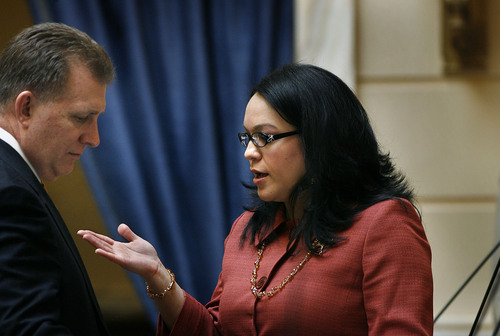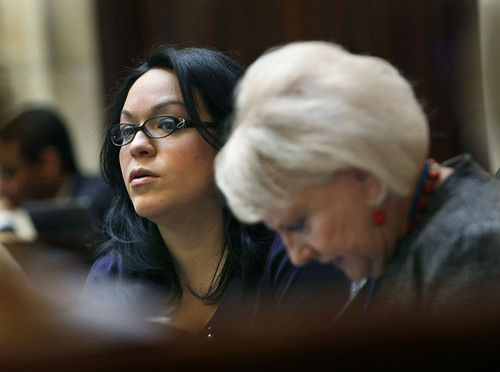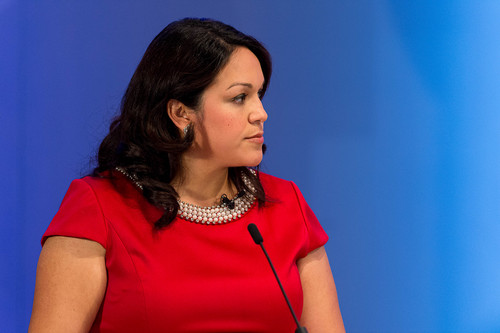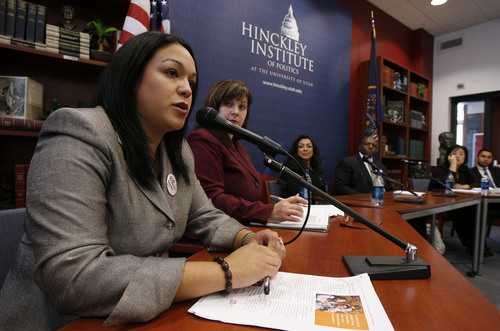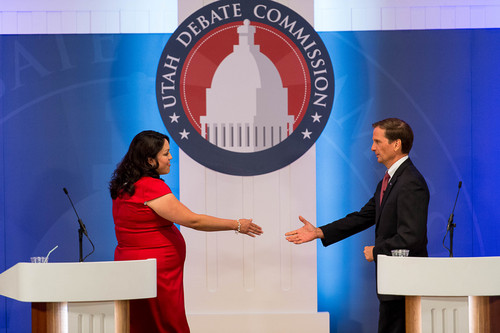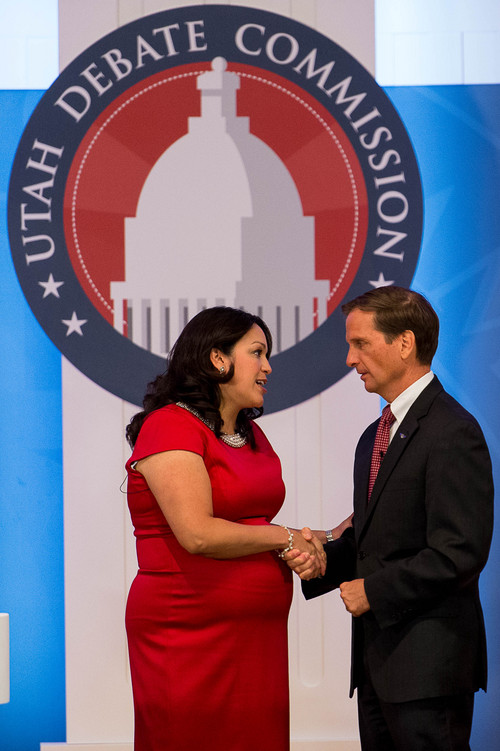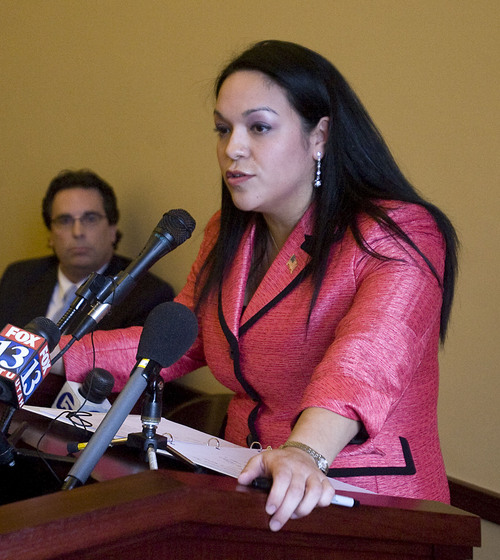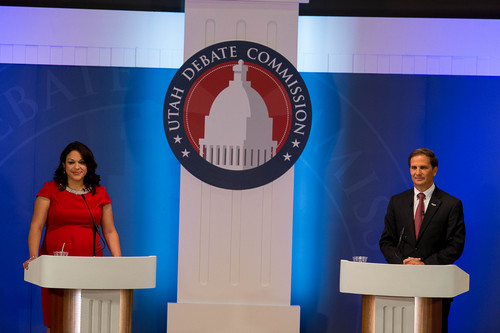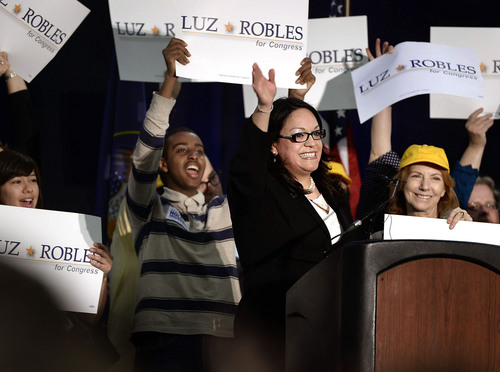This is an archived article that was published on sltrib.com in 2014, and information in the article may be outdated. It is provided only for personal research purposes and may not be reprinted.
When Democratic state Sen. Luz Robles is asked how she would end Washington gridlock if elected to Congress, she points to how she waged the biggest battle of her legislative career: leading opposition to a tough immigration-enforcement bill in 2011.
A GOP-friendlier compromise package passed instead.
That came after Robles reached across party lines to form alliances with key conservatives to craft alternatives. She even became friends with her main adversary, who now credits her for drastically changing his view on immigration reform.
Robles says that fight "was the best example that everything is possible, even when you think there's no way you can come up with an agreement."
It shows, the Salt Lake City Democrat says, that she can work across the aisle — something the 2nd District hopeful notes is sorely needed inside the Beltway.
—
The fight, the friends • In 2010, Arizona passed a strict bill to use local police to help remove undocumented immigrants. Then-Rep. Stephen Sandstrom, R-Orem, vowed to run a similar measure in Utah — and Robles, a naturalized citizen born in Mexico, became an early opponent.
She soon found herself at a dinner sitting next to Paul Mero, then the president of the conservative Sutherland Institute. Robles praised comments Mero had made against Arizona's law.
"She said, 'We ought to put our heads together. I think we would make a good team, and we could probably come up with a strategy that keeps Utah from going down the Arizona path,' " Mero remembers. They did just that. "She was criticized for working with us, and we were criticized for working with her."
They assembled a working group of 30 key members from across the political spectrum to discuss alternatives. It met for months. Many members peeled off, but a comprehensive reform package emerged. It included a state permit to allow undocumented immigrants to remain and work in Utah — after they paid significant fees, learned English and passed criminal background checks.
Mero, Robles and others drafted SB60, which Mero calls "the gold standard for state-based solutions" on immigration, one that could bring law-abiding immigrants out of the shadows.
Rep. Jeremy Peterson, R-Ogden, then a freshman, became the House sponsor — and she praises his bravery for jumping into a tense issue.
"She understood that the bill had to be bipartisan. That's why there was an effort to find a Republican willing to run the bill [in the House]. I was willing to do that," Peterson says. "I thought her tone and demeanor were very gracious and diplomatic. There was no partisan bomb-throwing. … She was a good partner."
—
Backstage, forward progress • After religious, business and civic leaders unveiled the "Utah Compact," seeking civility and protection of families in the immigration furor, Mero says pressure grew for action on Robles' bill.
"But the Republican Senate wasn't about to let a Senate Democrat take front stage," Mero says, adding that Republicans then wrote their own package while tapping many of her concepts.
Peterson says GOP colleagues "put more flesh on it and ornaments, but the fundamental aspect of that bill was the work she had done for the nine months prior with the Sutherland Institute."
Mero says he and Robles were in backroom meetings that huddled on the compromise package. "Frankly, she was disrespected. But she knew what had to happen," including letting Republicans take over the bill and alter it as their own.
"She accepted that," Mero says. "To me, that is a sign of leadership, statesmanship and personal virtue. My guess is I will remain her friend forever because of how she handled herself, because she was open and kind and loving even toward colleagues who treated her poorly."
Mero is not just speaking as a friend, but as a supporter of her current opponent, freshman Rep. Chris Stewart. Mero says he sees Robles as a liberal and would vote for Stewart because he likes the Republican's "total philosophical package" as a conservative. But he admires Robles' work and style.
—
Changing hearts, minds • In the immigration debate, Robles also reached out to Sandstrom to see if they could find middle ground.
At the time, they did not. But they treated each other so well that they became friends — and later co-sponsored bills for each other on other topics such as education and veterans benefits.
"I consider her a friend," Sandstrom says. "We always got along. Our conversations were always respectful and cordial. We actually collaborated on other bills. ... We could see differently on some things, but work together on others."
Sandstrom notes that when they sat down, "as two people trying to understand what direction the other is coming from, that is what ultimately led me to reaching out to the [Latino] community on the issue, and I tempered or changed my viewpoint."
Sandstrom met with undocumented immigrants and opted to support letting young people brought without documents by their parents to the U.S. to remain with full rights — and allowing the same for longtime undocumented residents who have not broken criminal laws.
"That was a huge change for me," the retired legislator says. "And I felt badly for taking such a hard-line stance" initially.
Despite his friendship with Robles, he, too, backs fellow Republican Stewart in the 2nd District contest.
—
Not a one-issue wonder • Because of the headline-grabbing 2011 immigration tussle, Robles worries too many voters believe "that's all I care about. That's not the case." She points to bills she has passed to help veterans with tuition and property taxes, and others to alter child custody and adoption laws.
"They were issues brought to me by constituents," she says. "I like to listen to them and help solve their concerns."
In her six years in the Republican-dominated Legislature, Robles, one of five Democrats in the 29-member Senate, has introduced 56 bills and passed 15 — for a batting average of .268.
But the Democrat says she sometimes has allowed Republicans to take over issues she pushes to improve chances of passage — as she did with immigration. That may lower her batting average, Robles says, "but it gets things done."
Politics may have killed one such measure this year. She wanted to buckle down on motorists for not buckling up, so she again pushed to permit police to pull over drivers and issue tickets directly for not wearing seat belts. Police currently can write such tickets only if they first stop a motorist for some other violation, such as speeding.
The Utah Highway Patrol, the Utah Department of Transportation, health departments and insurance companies have lobbied hard for such a bill, saying it could save lives by increasing seat belt usage. Some officials privately say they were sure they had support to pass such a bill this year — if someone else had sponsored it.
But Robles introduced it, and officials say that Republicans did not want to pass what could be an attention-getting bill in a year she is running for Congress — so they did not budge.
ldavidson@sltrib.com Coming Tuesday
A look at the first term of Rep. Chris Stewart, R-Utah. That story also is online now at sltrib.com.


